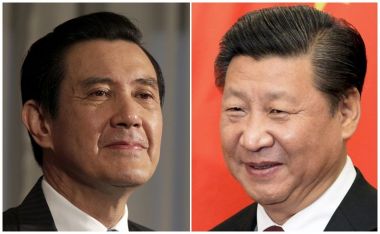Chinese and Taiwanese leaders to hold first meeting since civil war

Chinese President Xi Jinping will hold talks with his counterpart on neighbouring Taiwan on Saturday, the first meeting of leaders from the two rivals since the Chinese civil war ended in 1949.
The meeting coincides with rising anti-China sentiment on Taiwan.
Both governments said the leaders would discuss cross-strait ties at the unexpected meeting in Singapore, weeks ahead of presidential and parliamentary elections in January which the pro-China Nationalist Party, or Kuomintang (KMT), is likely to lose.
Taiwan President Ma Ying-jeou, who steps down next year due to term limits, has made improving economic links with China a key policy since he took office in 2008. He has signed landmark business and tourism deals, though there has been no progress in resolving their political differences.
Communist China deems the proudly democratic island a breakaway province to be taken back, by force if necessary, particularly if it makes moves toward formal independence.
Tsai Ing-wen, presidential candidate for Taiwan's main opposition Democratic Progressive Party (DPP), which traditionally favours independence, said the manner of the announcement damaged democracy.
"I believe people across the country, like me, felt very surprised," she said in prepared remarks to reporters.
"A meeting of the leaders of the two sides across the strait is a great event, involving the dignity and national interests of Taiwan. But to let the people know in such a hasty and chaotic manner is damaging to Taiwan's democracy."
DPP spokesman Cheng Yun-peng said the timing of the meeting was suspect. "How can people not think of this as a political operation intended to affect the election?" he said.
Political experts said China could also be working to shape the result by trying to show that ties will continue to improve if Taiwan remains ruled by the Nationalists.
That could backfire if there was widespread opposition in Taiwan to the meeting.
Ma's office said in a statement the purpose of his trip was to "maintain the status quo". He would not sign any agreements, nor issue any joint statements with China, it added.
Both sides agree there is "one China" but agree to disagree on the interpretation. Taiwan has been self-ruled since Chiang Kai-shek's Nationalists fled to the island following their defeat by Mao Zedong's Communists at the end of the Chinese civil war.
Zhang Zhijun, head of China's Taiwan Affairs Office, said the leaders would "exchange views on promoting the peaceful development of cross-Taiwan Straits relations", according to a statement carried by the official Xinhua news agency.
He called the meeting a milestone that would help manage conflict and would gain "wide support from all walks of life across the Strait and the international community".
The two leaders were expected to have dinner after their meeting and will address each other as "mister", Zhang said, presumably to avoid calling each other Mr President, as neither officially recognises the other as head of state.
The meeting came about after Chinese and Taiwanese officials met in the Chinese city of Guangzhou last month, he added.
No to unification
Speaking to Reuters in an interview on October 1, Ma said Taiwan was not ready to discuss unification with China. While economic and social gaps between the two were narrowing, their political differences remained wide, he said.
In what was seen as a backlash against creeping dependence on China, the Nationalists were trounced in local elections last year. Younger Taiwanese in particular worry about Beijing's influence and don't believe Taiwan benefits from closer economic ties with its giant neighbour.
Small groups of protesters gathered outside Taiwan's parliament on Wednesday.
Ma has made no public comment since the midnight announcement from his office but will hold a news briefing on Thursday.
"The Chinese are probably concerned that at the moment at least, the KMT is lagging far behind the opposition DPP in the polls," said Aaron Friedberg, professor at the Woodrow Wilson School at Princeton University.
Bonnie Glaser, an Asia expert at the Center for Strategic and International Studies in Washington, said Taiwanese had grown more sceptical about the relationship with China.
"It's hard to see how this (meeting) is really going to help his party remain in power," Glaser said.
White House spokesman Josh Earnest told reporters it was too early to call the meeting a turning point.
"We would certainly welcome steps that are taken on both sides of the Taiwan Strait to try to reduce tensions and improve cross-strait relations," Earnest said. "But, you know, we'll have to see what actually comes out of the meeting."
Previous Chinese attempts to influence Taiwan's elections have backfired.
In 1996, then-Chinese President Jiang Zemin ordered missile tests and war games in the seas around Taiwan to try to intimidate voters not to back Lee Teng-hui, who China believed was moving the island closer to formal independence.
The crisis brought the two sides to the verge of conflict and prompted the United States to sail a carrier task force through the Taiwan Strait in a warning to Beijing.
Lee won the election by a landslide.
Both China and Taiwan have good ties with Singapore. In March this year, Ma flew there to pay his respects after the death of the city-state's first prime minister, Lee Kuan Yew.
In 1993, Singapore was the location of the first direct talks between China and Taiwan since 1949.











